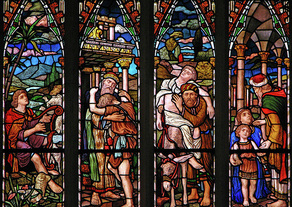I often believed that developing a personal relationship with God occurred out of a vacuum between just me and Him. Isaiah challenges this notion by saying a true fast in humbling yourself before God includes spiritual components of “loosening bands of wickedness” but also how you treat the less fortunate: “divide your bread with the hungry, bring the homeless poor in the house” (Is. 58:5-8).
Ps. 41-43 shows how paying attention to the less fortunate allows God to pay attention to you. God blesses an insightful person who cares for the helpless. He will deliver and protect him times of trouble. God heals his body and soul from physical sickness and sin, respectively (Ps. 41:1-4).
When enemies and even friends speak lies to make him look bad, God sets him in His presence so they can’t triumph over him (Ps. 41:5-13).
Tough circumstances like these motivate you to develop an intimate relationship with God like a deer panting after a water brook. Trials and tears make us thirst for God (Ps. 42:1-3).
The proper expression of faith involves heart-felt prayer where you tell God your honest feelings and praise Him in the midst of the corporate body of Christ (Ps. 42:4). In the rest of Psalm 42-43, the Psalmist demonstrates his honesty and the process so he can praise God again. He admits despair and turmoil, but still hopes in God. The present trial prevents Him from praising God (Ps. 42:5).
The first therapeutic step for the Psalmist is remembering a time when God seemed close to him. He recalled a time in the land of Jordan associated with Mt. Hermon and Mizar. He might have been climbing these mountains when God seemed very real to him. However, the reality of the great hurt was still present like waves rolling over him (Ps. 42:6-7).
The second therapeutic step for the Psalmist was remembering God’s ever-present lovingkindness during both the day and night. The feelings of mourning and oppression from the enemy were still very real to him. His whole body shattered and they ask mockingly, “Where is your God?” He acknowledged his despair and turmoil again, still hoping in God (Ps. 42:8-11).
The third therapeutic step for the Psalmist was his desperate pleading for deliverance from deceitfulness and injustice while mourning and being oppressed by the enemy. He asked that God send out light and truth to lead him into His presence where He could praise Him. He concluded with his refrain of despair and turmoil with expectation of praising God again (Ps. 43:1-5).
When you feel worn down and oppressed, remember that the evil one is behind it. Keep telling God how you feel, never losing hope that someday things will improve. Remember that this tough circumstance is increasing your desire for intimacy with God.
A key truth: God draws near to those who draw near to Him (James 4:8a). How do you draw near to God? Remember how Psalm 41 started: “consider the helpless”? By drawing near to the less fortunate or “to one of one of these brothers of Mine, even the least of them, you did it to Me” (Matt. 25:35-40).
In your difficult time, remember a time when God seemed close to you, acknowledge His love and then plead for deliverance. During the whole time, be honest and tell God how you really feel. Don’t forget that intimacy with God is dependent on you paying attention to the less fortunate.







